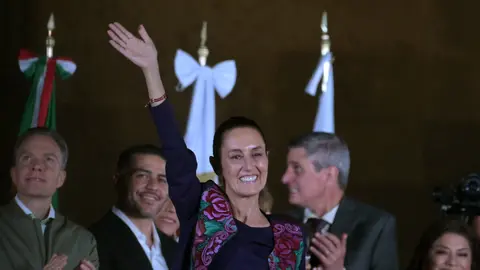The EU-Mexico Business Chamber is now a reality

Finally, this stumbling block was resolved last July with the creation of the Mexico-EU Chamber of Commerce, with Brussels as its logistical headquarters.
On the other side of the Atlantic, Mexico is seen as a fundamental axis for linking Europe with North, Central and South America. Due to their unique geographical location, Mexico and the EU work together to address common challenges such as security, migration and the promotion of human rights. The EU and Mexico have long-standing historical and cultural ties and share fundamental values such as democracy and respect for the rule of law.
Since 2000, bilateral relations between the EU and Mexico have been governed by the Economic Partnership, Political Coordination and Cooperation Agreement and, in 2008, a Strategic Partnership was signed to further strengthen bilateral relations in four areas: 1) political, 2) security, 3) environmental and 4) socio-economic affairs.
And, since 2018, the EU and Mexico have reached an agreement in principle to modernise the 2000 trade agreement, pending final approval by the European Parliament and Congress in Mexico to implement and replace the one still in force.
In the first twenty years of the Agreement's entry into force, flows of goods and services between Mexico and the EU were approximately 60 billion euros. Already in 2021, the EU remained the second largest net investor in Mexico with €6.9 billion (24.6% of total net FDI) only after the United States.
By 2023, the EU was Mexico's third largest trading partner with €81.7 billion, resulting from bilateral merchandise trade after the United States and China.
The EU was Mexico's second largest export market after the United States with €28.6 billion. The EU's main imports from Mexico are machinery and appliances, transport equipment, mineral products, optical and photographic instruments and products produced in the chemical industry.
The EU was also the third largest source of imports from Mexico, after the United States and China. The EU's main exports to Mexico include machinery and household appliances, transport equipment, chemicals and base metals.
The EU continues to record a trade surplus with Mexico: the surplus increased from €21.1 billion in 2022 to €24.6 billion in 2023.
Trade, economic, financial and business relations are increasingly present in Mexican companies that no longer look only to the United States, but also to various EU countries, to extend their influence. The Mexico-EU Chamber of Commerce has emerged precisely to help strengthen the relationship between the two sides of the Atlantic; in 2022, Mexican investments in the EU totalled 42.3 billion euros.
The presentation event was led by Rogelio Granguillhome Morfín, head of the Mexican Mission to the EU, in whose message to the businessmen present he recalled how, year by year, trade flows are more voluminous thanks to the fact that more and more sectors are expanding.
‘It is set up in Brussels with the capacity to deal with the European Commission, and with the aim of encouraging and protecting the interests of national companies before this institution in charge of regulation and technical issues for exporting and importing,’ said the diplomat.
The establishment of MexChamEu adds to efforts to strengthen bilateral trade, focusing on sectors with high growth potential such as technology, agriculture, manufacturing and renewable energies. It will also help to attract European investment to Mexico, ensuring mutual economic benefits.
Ambassador Granguillhome reiterated that the new business partnership is a very valuable instrument for the promotion of more trade and investment, but above all to better understand the terms and rules prevailing in the EU.
During the event, held at the headquarters of the Mexican Mission to the EU, the Undersecretary of Foreign Affairs, María Teresa Mercado Pérez, gave a message, virtually, in which she welcomed the launch of the Chamber and noted that it is a testament to the enduring partnership between Mexico and the EU, which will serve as a bridge for the business communities.
For his part, the President of the Chamber of Commerce, Gokhan Kantarcigil, expressed his enthusiasm for the launch at a time when the dynamics of global trade are rapidly evolving. ‘Our mission is to create new opportunities, drive economic growth and foster innovation by leveraging the strengths of Mexico and the EU,’ he said.
The MexChamEU will place special emphasis on supporting small and medium-sized enterprises (SMEs) to expand more quickly in the various European markets; and will be the voice of business, advocating for policies to facilitate trade, investment and to address any barriers to economic cooperation.
The opening ceremony was attended by European government officials, associations and business leaders, as well as diplomats from other countries accredited to the EU, who had the opportunity to exchange strategies for economic growth.
The Chamber of Commerce announced a series of initiatives and events including briefings with European and Mexican business associations and Mexican Embassies in Europe.
A great reception
César Guerra Guerrero emphasised the expectation generated around the birth of this business organisation, which has been set up in Brussels, the seat of the EU's governing bodies.
‘We have undoubtedly taken an important step forward. We have been approached by various bodies involved in foreign trade and we are exploring how we can work together. It seems to me that we have struck a chord in the Mexico-EU relationship and that it deserves to be taken to another level,’ said Guerra Guerrero.
In the opinion of the Secretary General of the Mexico-EU Chamber of Commerce, while the United States is a natural partner for Mexico for obvious geographical reasons, there is an intense and growing interest in Europe.
‘Europe is also a vital territory. For Mexico, it is the second largest export destination after the United States; and the EU is the second largest investor in Mexico, after the United States. So, we have an intense relationship that we have wanted to strengthen through the modernisation of the trade agreement that has been stuck, and we want to see how we can help with this new initiative,’ Guerra Guerrero added.
The modernisation should have been approved by now, but for one reason or another it is still being delayed: ‘We would like to contribute to unblocking the negotiations, this modernisation will result in a better trade instrument that will open up new opportunities’.
It seems that Mexico is in vogue in several EU countries...
Yes, we see it very clearly. We have the case of Spain, where it is already the leading investor in Latin America; there is also a good moment with Belgium, with Germany, with the Netherlands... yes, there is a good moment for Mexico abroad.
Guerra Guerrero told me that Spain is the country of entry for many Mexican companies seeking to expand their presence in the EU, and in recent years there has been an intense influx of Mexican businessmen with commercial and business interests.
What is known about the progress of the modernised Agreement?
This modernisation is very important because the agreement that currently governs trade exchanges was the first trade agreement that the EU negotiated with a country in the Americas. We are very proud to have been the first and that is why we see that other Central American or Latin American countries that signed agreements with the EU in subsequent years have achieved better conditions for exporting their products to the EU. And Mexico has to pay higher tariffs, which is why this modernisation is so important because it will give us better access to the EU market.
Why did it take so long to have a Mexico-EU Chamber of Commerce?
I don't know the specific reason, but we finally have it. This Chamber will be a very useful tool to listen to the interests of Mexican exporters and producers. Before, there was no body to look after the interests and decisions taken in Brussels that affect Mexican exporters, who had not had a voice to represent them.
Guerra Guerrero speaks of a hopeful atmosphere: ‘In fact, next year will be the 25th anniversary of the entry into force of the Economic Partnership, Political Coordination and Cooperation Agreement, and we could be celebrating doubly if the modernised agreement finally comes into force’.
Spain, a magnet for Aztec companies
The presentation in Brussels was attended by various business associations from different parts of Europe eager to work with MexChamEU. Ángela de Miguel, president of the Mexico-Spain Business Association, was in attendance, motivated by the desire to generate cooperation ties. Ivonne Cuevas, who represented the Casa de México en Málaga y Andalucía, a private organisation that has successfully united the business interests of Mexicans and Andalusians in a very short period of time.
Spain is the main gateway for Mexican investment capital to the EU, to such an extent that, in terms of investment, Mexico is the leading Latin American investor in Spain: according to the 2023 report of the Business Council Alliance for Ibero-America (CEAPI), Mexico has 245 companies in Spain, representing 44% of the companies with majority Latin American capital in the Iberian country.
Estimates foresee more investment flows: over the next four years, it is expected that Aztec capital in various areas in Spain will grow by between 35 and 40 per cent.
The Ibero-American General Secretariat (Segib) points out that Latin American investment in Spain is mainly concentrated in Mexico, which will account for 33,096 million euros of investment between 1993 and 2023, 49.5 per cent of the total.
Last year, this share was even exceeded, as 58% of the money coming from Latin America was Mexican capital, with 1,645 million euros.
‘Mexican companies, of various sizes and from different sectors, are already targeting their strategy to position themselves in Spain, we are seeing this boom and we believe that it will also extend to other EU countries. The business chambers are there to make it easier for these businesses to have all the information they need to make the right decisions,’ said De Miguel during his participation in Brussels.



